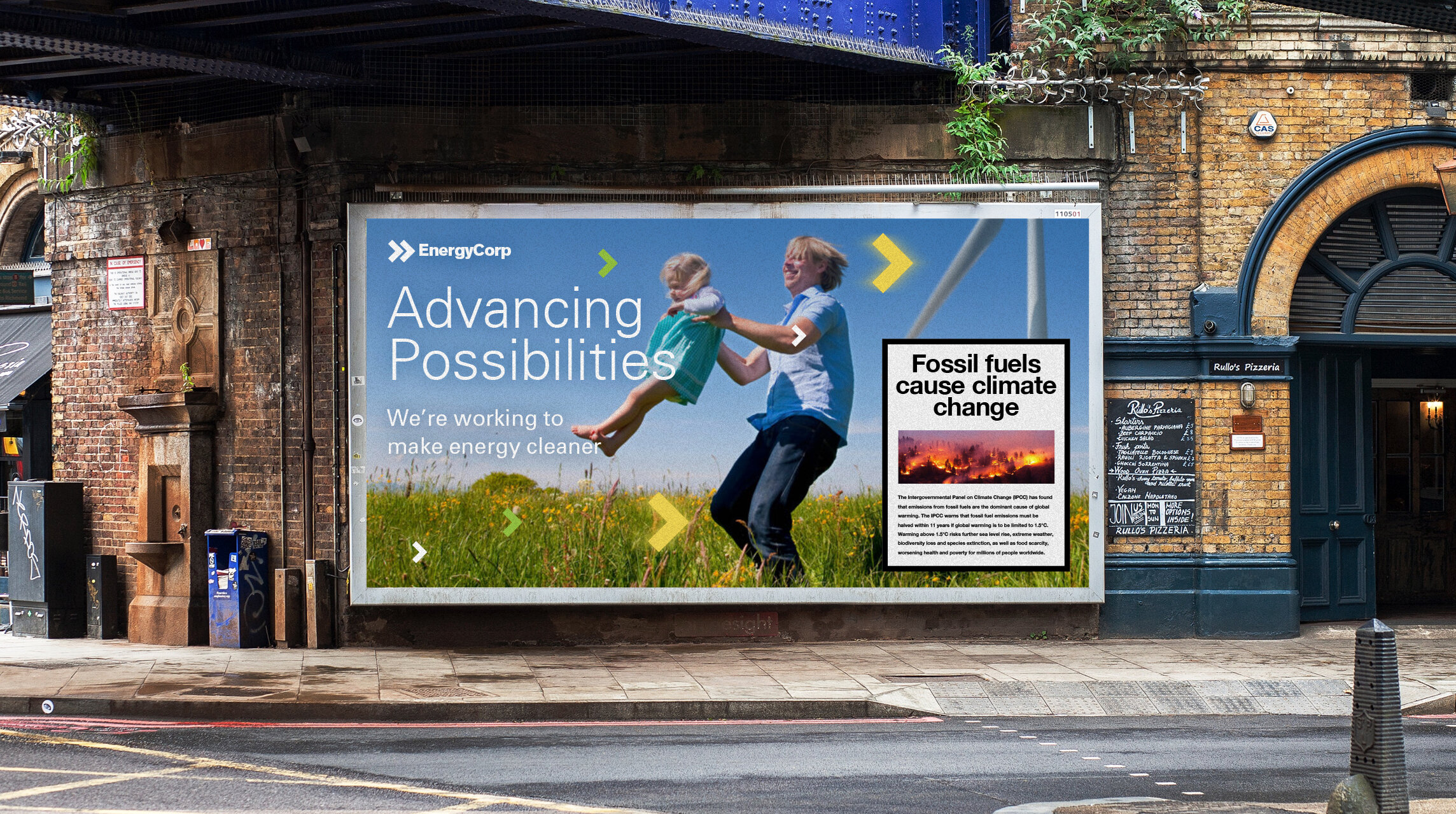A bunch of green lies: Fossil fuel companies’ greenwash advertising uncovered by ClientEarth
Image credit: ClientEarth
New report from environmental law firm ClientEarth unveils the extent of “greenwashing” pursued by fossil fuel companies who are pledging to take climate commitments seriously in their public communications.
The report looks at the advertising from nine of the world’s largest fossil fuel industries and compares their public claims with indicators on their business operations and their progress in meeting safe climate change targets. The results are striking: all these companies are promoting themselves as “part of the solution” to tackle climate breakdown while in reality their businesses remain strictly rooted in the continuous exploration and promotion of fossil fuels.
“Our analysis shows that their publicity routinely misrepresented the sustainability of their activities, avoided the full scale of their greenhouse gas emissions, overrepresented clean energy investments and promoted commercially unproven ‘solutions’ to ongoing fossil fuel production.” - ClientEarth.
Video Credit: ClientEarth
What is greenwashing?
According to Sophie Marjanac - ClientEarth’s Accountability Lead - companies engage in ‘greenwashing’ when they use “advertising and public messaging to try to appear to be environmentally sustainable and green – greener than it really is”.
The report lists some of the most egregious examples of greenwash attempted by fossil fuel companies. For instance, Aramco (State-owned Saudi Arabian oil & gas giant) published ads in newspapers in which it branded itself as a “sustainability company” where in fact it is the world’s largest corporate emitter of carbon emissions. As stated in its 2020 Annual Report, the company is also planning to remain a leader in fossil fuels: “Aramco intends to maintain its position as the world’s largest crude oil company by production volume”. If production rates remain the same as their 2020 levels, the company’s oil and gas reserves could last well until 2077.
Aramco - State-owned Saudi Arabian fossil fuel company and the largest corporate greenhouse emitter in the world (4% of historic carbon emissions since 1965). Image credit: ClientEarth
Sophie Marjanac argues that greenwashing is also used as a tool by companies to distract consumers from the reality of their business model or activities that are highly damaging for the planet. Fossil fuel companies have become masters in developing these strategies, as ClientEarth’s analysis suggests, by re-using popular language from climate change circles such as “net zero targets”, “low carbon” or “circular economy” .
The business of selling (green) lies
There are many parallels between the advertisements and public claims made by those companies who spend millions on campaigns boasting about their ‘low-carbon projects’ and stressing their ‘climate pledges’ and ‘net-zero’ targets in line with international climate agreements. Looking at these ads, one could easily be tricked into thinking that these companies are actually serious about transitioning their businesses towards renewable energy and phasing out their fossil fuel operations. ClientEarth's new analysis tells us we shouldn’t be fooled by all this green talk. Looking into the companies’ own business reports and the amount of oil and gas reserves they are still planning on burning, there is nothing remotely true about what these fossil fuel corporations pretend to be doing for the climate.
ExxonMobil - the company’s algae biofuel project has been criticised for being a token project and for its lack of economic feasibility. The fossil fuel company is still heavily invested in fossil fuels and only spent 0.14% of its 2020 capital expenditure on biofuels. Image credit: ClientEarth
The discrepancy between these companies’ greenwashing ads and their climate-wrecking business models could not be more telling. Many of us are however not falling for their misleading green claims. In April 2020, 60 complaints were sent to the UK advertising regulator in relation to Aramco’s “powering a more sustainable future” ads, which the company ended up removing. But more often than not greenwashing adverts work in practice. Research from Clemens Kaupa in the Journal of European and Consumer Market Law shows that these advertising strategies are blurring the lines between what is true or not and making it increasingly difficult for us to judge the validity of these companies’ claims. Activists have long denounced marketing practices by fossil fuel giants for helping them curate their image to the general public and granting them a “social license to pollute”.
“They [fossil fuel companies] have invested in reputational advertising that shifts the conversation to action by consumers and governments, positions themselves as trusted partners to wider society and promotes the role fossil fuel companies play in the climate transition. - Client Earth”
How can we stop greenwashing?
Client Earth is asking for a ban of all advertising from fossil fuel companies unless they come with climate warning signs - similar to the tobacco-style health warnings. We support these recommendations and go even further to include other high-carbon companies - airlines and carmakers - who are similarly engaged in greenwashing practices and are profiting from the climate crisis.
As long as they remain unchallenged, these powerful companies will keep relying on carefully curated marketing and advertising strategies to promote their climate-bashing businesses. To remove their social license, ending high-carbon advertising is a first and necessary step.



